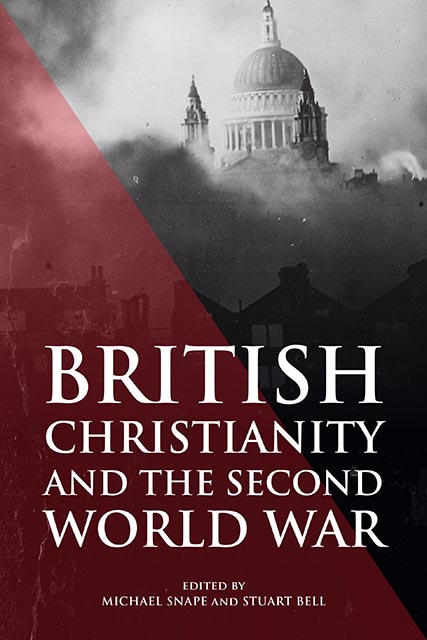Book contents
- Frontmatter
- Dedication
- Contents
- Contributors
- Acknowledgements
- Note on Footnotes
- Abbreviations
- 1 Introduction
- 2 The British State and Spiritual Mobilization during the Second World War
- 3 Radio Religion: The British Broadcasting Corporation and Faith Propaganda at ‘Home’ and ‘Overseas’ in the Second World War
- 4 Getting the Message Out: Publishing ‘British Christianity’ 1939–43
- 5 Christianity, Culture, and the Universities in Wartime England
- 6 Mass Observation, Religion, and the Second World War: When ‘Cooper’s Snoopers’ Caught the Spirit
- 7 British Sunday Schools during the Second World War
- 8 Principled or Pragmatic? English Nonconformist Opposition to Pacifism in the Inter-War Period
- 9 Where Loyalties Lie: English Catholic Responses to Allied Strategic Bombing in the Second World War
- 10 British Christians and the Morality of Killing in the Second World War
- 11 Jewish-Christian Relations in the Second World War
- 12 Agents of Occupation or Reconciliation? Army Chaplains in Germany in the Summer of 1945
- Index
- Studies in Modern British Religious History
12 - Agents of Occupation or Reconciliation? Army Chaplains in Germany in the Summer of 1945
Published online by Cambridge University Press: 21 June 2023
- Frontmatter
- Dedication
- Contents
- Contributors
- Acknowledgements
- Note on Footnotes
- Abbreviations
- 1 Introduction
- 2 The British State and Spiritual Mobilization during the Second World War
- 3 Radio Religion: The British Broadcasting Corporation and Faith Propaganda at ‘Home’ and ‘Overseas’ in the Second World War
- 4 Getting the Message Out: Publishing ‘British Christianity’ 1939–43
- 5 Christianity, Culture, and the Universities in Wartime England
- 6 Mass Observation, Religion, and the Second World War: When ‘Cooper’s Snoopers’ Caught the Spirit
- 7 British Sunday Schools during the Second World War
- 8 Principled or Pragmatic? English Nonconformist Opposition to Pacifism in the Inter-War Period
- 9 Where Loyalties Lie: English Catholic Responses to Allied Strategic Bombing in the Second World War
- 10 British Christians and the Morality of Killing in the Second World War
- 11 Jewish-Christian Relations in the Second World War
- 12 Agents of Occupation or Reconciliation? Army Chaplains in Germany in the Summer of 1945
- Index
- Studies in Modern British Religious History
Summary
The Second World War ended differently from previous wars. When the German forces surrendered in May 1945, there was no longer any recognized authority with whom a state of peace could be established. British troops were in Germany because they had been fighting there and, although known as the ‘British Liberation Army’ elsewhere in Northwest Europe, in Germany it would be the ‘British Occupation Army’. The army could not immediately return to Britain as it now needed to ensure that the Military Government, and subsequently the civilian ‘Control Commission Germany’, could carry out their tasks in safety. One major goal was to re-establish a state organized along democratic lines. The role of the German churches in assisting this would be important and meant that relationships between the British and German churches and faith groups were crucial. One group that was to become involved, at least initially, with this task were British army chaplains. Among the British Occupation Army were some 300 members of the Royal Army Chaplains’ Department (RAChD). Since 1920, these were organized into two administrative groups – Catholics in one group and all the remaining chaplains in the other. This system of dual administration would remain among the chaplains serving in Germany. Chaplains were priests and ministers serving with the blessing of the faith group which they represented, being recruited on a ratio of 1:1000 to the adherents of their faith community churches. By the time they arrived in Germany most were well embedded with the headquarters or unit to which they were attached. As no detailed study of army chaplains in the Second World War covers this period, this chapter will discuss the challenges faced by members of the RAChD in the summer of 1945 as they settled into a strange land in a unique situation. It will look first at a specific instruction that banned chaplains from having any other than formal relations with the German population in general and, specifically, with German churchmen. It will then examine the tensions that developed as chaplains carried out their ministry as part of the forces of occupation. Finally, it will consider the uncertainty that existed over the role of chaplains in the long-term relationship between the British and German churches.
Preparation for the occupation: non-fraternization
After the break-out from Normandy in August 1944, there had seemed to be a possibility that the war would be over before the end of the year.
- Type
- Chapter
- Information
- British Christianity and the Second World War , pp. 198 - 214Publisher: Boydell & BrewerPrint publication year: 2023

